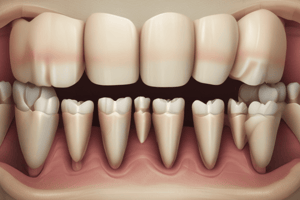Podcast
Questions and Answers
What is the mean difference between Group A and Group B?
What is the mean difference between Group A and Group B?
- 7.5333
- 26.8667
- -19.3333 (correct)
- 19.3333
Which group has the highest mean value?
Which group has the highest mean value?
- Group C (correct)
- Group A
- Group B
- All have the same mean
What is the significance of * in the LSD Multiple Comparisons table?
What is the significance of * in the LSD Multiple Comparisons table?
- No significant difference
- Significant difference at 0.001 level
- No difference
- Significant difference at 0.007 level (correct)
How many groups are compared in the LSD Multiple Comparisons table?
How many groups are compared in the LSD Multiple Comparisons table?
What is the mean of all the groups combined?
What is the mean of all the groups combined?
What is the error std in the LSD Multiple Comparisons table?
What is the error std in the LSD Multiple Comparisons table?
How many samples are in Group A?
How many samples are in Group A?
What is the mean difference between Group B and Group C?
What is the mean difference between Group B and Group C?
What is the significance of the comparison between Group A and Group C?
What is the significance of the comparison between Group A and Group C?
How many times is the significance level 0.007 in the LSD Multiple Comparisons table?
How many times is the significance level 0.007 in the LSD Multiple Comparisons table?
Flashcards are hidden until you start studying
Study Notes
Study Design
- 45 human maxillary premolars were used, with normal occlusal anatomy, comparable crown dimensions, and no attrition.
- Teeth were visually inspected with blue light transillumination to ensure enamel was free of cracks.
- Three experimental groups were randomly assigned to receive direct composite veneers using different materials.
Materials and Preparation
- Group A: Nano composite (Z350 XT, 3M, USA).
- Group B: Flowable composite (G-aenial Universal flo, GC, Japan).
- Group C: Nanohybrid Composite (G-aenial GC, Japan).
- Uniform preparations (partial wrap) were made for all teeth using veneer system preparation burs (Komet, Germany).
- The cervical third of the face shrunk by 0.4 mm and 0.5 mm, respectively, compared to the middle and occlusal thirds.
Fracture Resistance Test
- The test was used to measure the fracture strength of the veneers.
- The mean fracture load for Group C (restored with nanohybrid composite) was the greatest.
- This was associated with the increased mechanical qualities of the nanohybrid composite, with high filler weight and volume percentages (76% and 72%, respectively).
Previous Studies
- Studies have shown that laminate veneers with cuspal reduction have improved mechanical performance (lower stress concentration).
- The use of nano- and micro-hybrid particles may be a factor in increased fracture resistance.
- Previous studies have also investigated the fracture strength of direct and indirect laminates with and without fiber application.
Studying That Suits You
Use AI to generate personalized quizzes and flashcards to suit your learning preferences.




